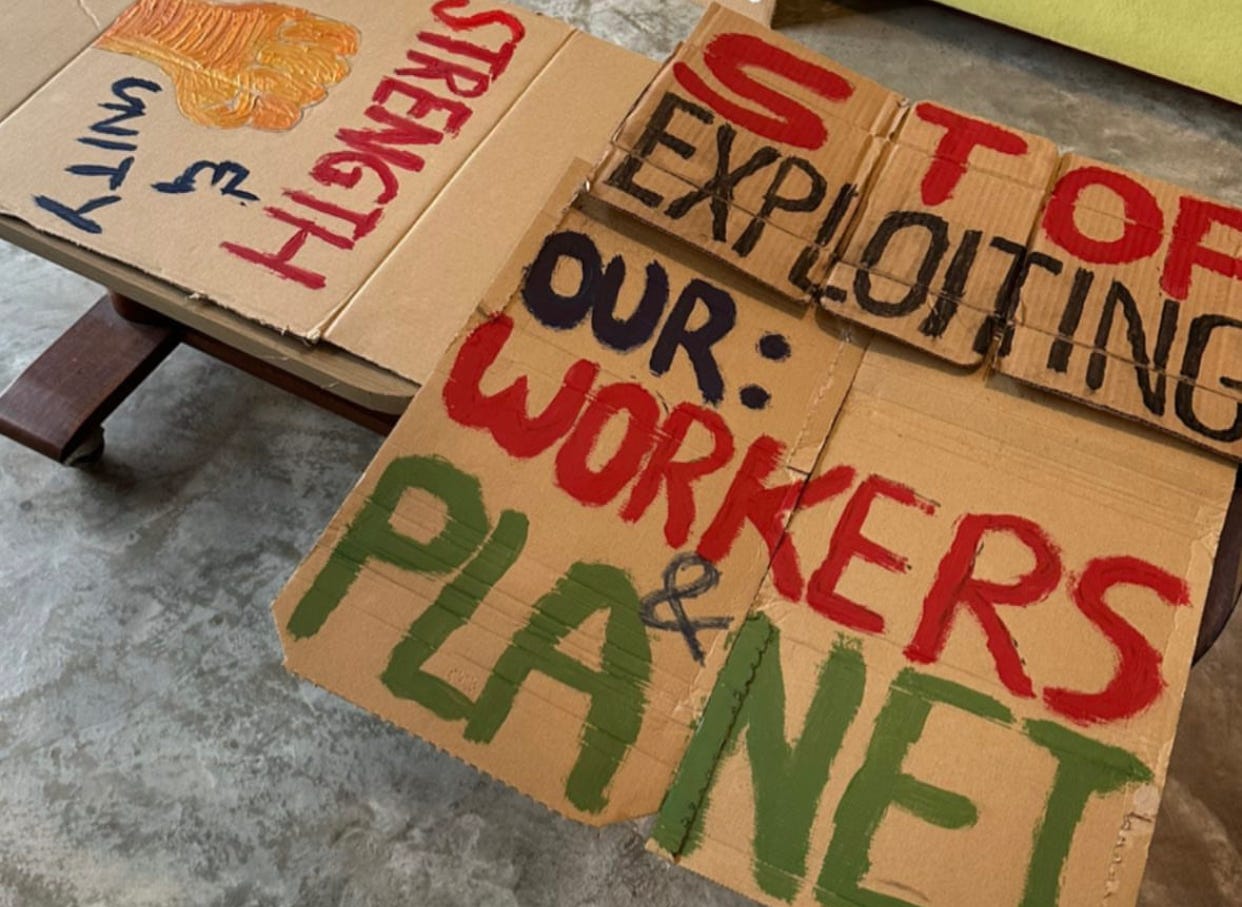Dear friend,
Today is Labour Day, and just about a week ago we celebrated Earth Day. Both are days which first originated as mass protests that demonstrate what people power can do, and show there are many common goals shared by both the labour and environmental movements.
On 1 May, 1886, labour unions across the United States went on a general strike and held rallies in support of the eight-hour work day that many take for granted today. Almost 84 years later, the first Earth Day was the largest single-day protest with 20 million Americans demonstrating for environmental reform. This was only made possible with immense support from labour unions, in particular the United Auto Workers, which provided funding, telephone capabilities, printing and mailing, and mobilised its members to participate in the public demonstrations.
Closer to home, many farmers in 1950s and 60s Singapore grew vegetables and fruit or raised animals in kampongs, and lived with a close relationship to the land. They formed organised groups like the Singapore Farmers’ Association and Singapore Wooden House Dwellers’ Association that resisted the British and eventual PAP government’s attempts to evict them, while having close ties to labour unions and sustaining workers on strike with fresh food. Though their efforts eventually failed and these groups were forced to dissolve by the government, they remind us that such intersections between labour and environment are not new, even in Singapore. Our 2021 campaign for better rights for food delivery riders and private hire drivers is a more recent example.
We hope you will join us at Hong Lim Park from 3-7pm today, and if you do, drop by our booth to say hi! See here for more details.
For a better world,
SG Climate Rally
What does a just transition away from the climate crisis look like? It starts by listening to those who are most affected by inequality. In Tak Boleh Tahan In The Climate Crisis, we reflect on the recent Tak Boleh Tahan town halls organised by Manifestival, how the concerns of the working class are intertwined with the effects of climate change, and how climate activists can build a broad coalition with the working class.
Over on our Instagram, we’ve published a post about our recent Nature Club discussion “Entangled Life”, a book on mycology by biologist Merlin Sheldrake, and a collaboration together with Living Soil on Earth Day, about the ecology of care, and how caring for the earth is interconnected with self-care and caring for our communities.
On that note, our editorial team recently went for an art jamming session at Fort Canning Park! Activities like this are one of the ways we try to sustain a regenerative movement and avoid burnout among our members, all of whom are volunteers who contribute their time and effort amongst full time jobs and other commitments. Check out this video by one of our members to see the results.
Global News
🌡️🌏 The South and Southeast Asian region has been hit with scorching heatwaves over the past month, with temperatures as high as 45 degrees Celsius in parts of India, Thailand, and Myanmar. At least 13 people died of heatstroke during an outdoor awards ceremony in Mumbai on 16 April. While heatwaves are not uncommon during this time of year, extreme heat conditions are exacerbated by the impact of climate change as well as the El Nino weather phenomenon.
Local News
🌤️👨🔬 Climate scientist Assoc. Prof Winston Chow has been nominated to the bureau of the Intergovernmental Panel on Climate Change (IPCC) to serve as a co-chair for the upcoming seventh assessment report cycle (AR7). He will contribute to Working Group II, which focuses on the impact of climate change on the planet and possible adaptation measures. Congratulations to Prof Chow!
🇸🇬💸 The debate over Singapore’s status as a developing country and potential claimant of loss & damage funding continues in Parliament (we covered this in last month’s newsletter). In response to Workers’ Party MP Leon Perera’s question on why Singapore was a potential claimant given that its GDP per capita is much higher than other potential claimants, Minister for Sustainability and the Environment Grace Fu maintained that SIngapore’s position is still open, and asked Mr Perera if he supported Singapore contributing to the fund, and if so, how much would the amount be. Read more details about what was discussed in Parliament here.
🛫📸 National Geographic has launched a new promotion, where for the princely sum of US$99,995, you can hop on a private jet and explore various conservation efforts in wildlife reserves all over the world, starting from Singapore. Needless to say, this is deeply ironic considering National Geographic’s dedication to conservation efforts, and the epitome of climate injustice, as the ones who will pay the price of the increased emissions from this trip are the animals in the reserves and the local communities protecting them. SGCR was asked for our comments, which you can find in Eco-Business, but the gist is that we’ve done the math, and one passenger’s carbon emissions on this trip is roughly 5.25 tonnes, equivalent to 19 economy-class return trips to Bali, or the annual emissions of 40 Rwandans – the final stop of the trip itinerary. Do better, Nat Geo.
🛢️💰 A recent S$100m donation from the Low Tuck Kwong Foundation, named after coal tycoon Low Tuck Kwong, to the Lee Kuan Yew School of Public Policy has spurred debate (we covered the news in an earlier edition of this newsletter). David Fogarty of The Straits Times writes in an op-ed that “the gift seems at odds with the Singapore Government’s recent adoption of much more ambitious climate targets”. However, a NUS alumnus wrote into the ST Forum to say that they were thankful for the donation, which “can go towards advancing research in green energy.” Should universities and/or other organisations accept funding from fossil fuel companies who are committed to a transition away from fossil fuels? Or is it greenwashing? For more on the links between the fossil fuel industry and Ivy League universities, read Kate Aronoff’s latest piece at The New Republic.
📦🚛 Online shopping is a lot of people’s favourite pastime, but it generates large amounts of carbon emissions, from the manufacturing end, transport, and packaging, not to mention how fast fashion increases needless consumption. Can it be made greener? Listen to CNA’s The Climate Conversations podcast episode with DHL Express Singapore’s managing director Christopher Ong on how the logistics industry can reduce their dependence on fossil fuels.
💚💚 Finally, one of our very own SGCR members, Phoebe, was featured in FEMALE Magazine’s profile on 8 female environmental advocates! Read more about her environmental advocacy journey, and why she joined SGCR.









